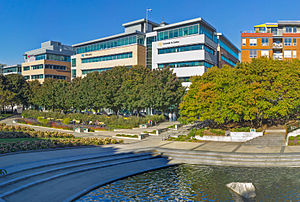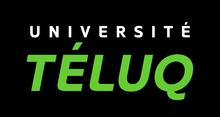Université TÉLUQ
This article needs additional citations for verification. (April 2015) |
show This article may be expanded with text translated from the corresponding article in French. (December 2016) Click [show] for important translation instructions. |
 Université TÉLUQ headquarters in Quebec City | |
| Type | Public |
|---|---|
| Established | 1972 |
| Rector | Lucie Laflamme |
Academic staff | ~90 professors |
| Undergraduates | c. 20,000 (distance learning) |
| Address | 46°48′50.04″N 71°13′22.44″W / 46.8139000°N 71.2229000°WCoordinates: 46°48′50.04″N 71°13′22.44″W / 46.8139000°N 71.2229000°W |
| Campus | Distance learning |
| Affiliations | Université du Québec CVU AUCC |
| Website | https://www.teluq.ca/ |
 | |
Université TÉLUQ is a public French-language distance learning university, part of the Université du Québec system. Originally founded in 1972 as the Telé-université, Université du Québec commission to develop distance education courses, Université TÉLUQ is now a full university which offers programs in undergraduate and graduate studies. Though it is based in Quebec City, Quebec, about two thirds of its professors work from its Montreal offices.
Students[]
It has over 20,000 students, more than half of them in the Montreal area.[1] Most students (71%) are females. About a third of all students (35%) taking courses at TÉLUQ are from other universities or in on-campus programs. Most students (64%) are between 20 and 34 years old. About a fifth of the student population (22%) holds a degree. Further information in the French version.
There is a student union AÉTÉLUQ ([1]).
Programs of study[]
Université TÉLUQ offers hundreds of programs at all levels of study, from bachelor's degrees to master's and Ph.D.s. Programs are offered by four departments:
- School of Administrative Sciences
- Department of Education
- Department of Science and Technology
- Department of Humanities, Languages, and Communication
Once a program is completed, the diploma is awarded by the Université du Québec.
Teaching methods[]
Université TÉLUQ offers several types of courses. Support format includes paper, DVDs, and Web sites (using content management tools such as SPIP).[2]
Courses are designed by teams led by a professor. Teams include research assistants, associate designers, education science specialists, proof readers and other edition staff.
Under the authority of a professor, tutors help students and mark assignments. Further information in the French version
Research[]
Université TÉLUQ has one research center in informatics: LICEF.
Université TÉLUQ has three Canada research chairs:
- Canada research chair in biomedical data-mining;
- Canada Research Chair in Media Education and Human Rights;
- Chaire de recherche du Canada sur le jugement éthique.
Université TÉLUQ signed the Berlin Declaration on Open Access to Knowledge in the Sciences and Humanities. Accordingly, it offers an open access repository where the public can access the research works it produces.
Further information in the French version
Notable faculty and alumni[]
- Richard Hotte – professor of information technology at Université TÉLUQ and current UNESCO Chair in Global Smart Disruptive Learning
- Normand Landry – professor of communication at Université TÉLUQ and current Canada Research Chair in Media Education and Human Rights
References[]
- Distance education institutions based in Canada
- Education in Quebec City
- Educational institutions established in 1972
- Université du Québec
- Schools in Quebec City
- Schools in Montreal
- 1972 establishments in Quebec
